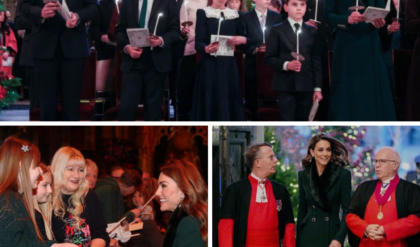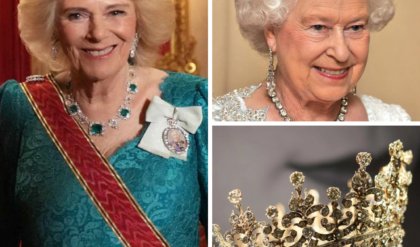The announcement of HBO’s Harry Potter television series, set to reimagine JK Rowling’s iconic wizarding world, has sparked intense debate, particularly surrounding the casting of Paapa Essiedu as Severus Snape. Essiedu, a Black British actor, marks a significant departure from the pale, gaunt Snape portrayed by Alan Rickman in the original film series. Social media platforms, especially X, have erupted with claims that Rowling has “lost it” over this “race-swapped” casting, with some fans decrying it as a betrayal of the source material. However, a closer examination of Rowling’s response, industry reports, and fan sentiment reveals a more nuanced story. This article explores the controversy, its origins, Rowling’s actual stance, and the broader implications for the Harry Potter reboot, drawing on recent web sources and posts on X.
The Casting Announcement and Initial Backlash
In March 2025, HBO confirmed Paapa Essiedu, known for roles in I May Destroy You and The Lazarus Project, as Severus Snape in its upcoming Harry Potter series, slated to begin filming this summer. The casting, alongside other notable actors like John Lithgow as Dumbledore and Janet McTeer as McGonagall, was initially met with excitement for its fresh take on the beloved franchise. However, the decision to cast a Black actor as Snape—a character described in the books as having “sallow skin,” “greasy black hair,” and a “pale” complexion—ignited a firestorm among certain fans.
Posts on X captured the intensity of the backlash. One user, @The_LFB, argued that casting Essiedu was a mistake because Snape’s skin color was “problematic for the story,” suggesting it altered the dynamics of his backstory. Another, @Shane00, called the casting “race-swapping” and vowed to boycott the series unless Snape was recast, claiming it changed the character fundamentally. A particularly vocal post by @AtlusAvalon labeled the decision a “slap in the face” to Rowling’s work, urging fans to “#SaveSnape” to preserve the character’s authenticity. These reactions framed Essiedu’s casting as a deliberate deviation from canon, fueling speculation that Rowling, known for her hands-on involvement with Harry Potter adaptations, was furious.
Rowling’s Response: Measured or Misrepresented?
Contrary to claims that Rowling “lost it,” her public statements suggest a more restrained reaction. On May 5, 2025, Rowling addressed rumors about her influence over the casting, specifically responding to speculation that she might push to fire Essiedu due to his support for trans rights, which conflicts with her gender-critical views. She wrote on X, “I don’t have the power to sack an actor from the series and I wouldn’t exercise it if I did. I don’t believe in taking away people’s jobs because they hold legally protected beliefs that differ from mine”. While this statement focused on Essiedu’s political stance rather than his race, it implicitly acknowledged his casting without objection.
Reports from The Independent, The Guardian, and Variety corroborate that Rowling has not expressed outrage over Essiedu’s casting itself. An insider quoted by MailOnline stated that Rowling “doesn’t care” about Essiedu’s public positions or the casting controversy, viewing the Harry Potter franchise as “bigger than any one actor” and focusing on its expansion. This aligns with HBO chief Casey Bloys’ assertion that Rowling’s involvement in the series, including her input on casting, has not been swayed by external controversies, and that the show will not reflect her personal political views.
The narrative of Rowling “losing it” appears to stem from misinterpretations of her broader online activity. Rowling has been vocal on X about her gender-critical beliefs, recently clashing with figures like Boy George and facing criticism from Harry Potter alumni like Daniel Radcliffe and Emma Watson. Some fans conflated her outspokenness with disapproval of the Snape casting, projecting their own discontent onto her. For instance, a post by @popculture_show claimed Rowling “refuses to fire woke Snape,” framing her inaction as a reluctant concession rather than acceptance. This distortion amplified the perception of a meltdown that, based on available evidence, never occurred.
:max_bytes(150000):strip_icc()/jk-rowling-alan-rickman-paapa-essiedu-050725-aa6ebac226774c199dbff28188f87672.jpg)
The Case for and Against Race-Swapping Snape
The controversy over Essiedu’s casting hinges on the concept of “race-swapping,” a term used by critics to describe casting actors of different racial backgrounds than those implied or described in source material. Fans opposing the decision argue that Snape’s physical description—pale, sallow, and unkempt—is integral to his character. In the books, Snape’s appearance reflects his marginalized upbringing, his role as a double agent, and his unrequited love for Lily Potter, which is complicated by his bullying at the hands of James Potter. A post on X by @Tasnek expressed concern that casting a Black actor as Snape, described as “pale, unwashed, and hung in the air unfairly,” could disrupt these dynamics, particularly the racial undertones of his bullying. MailOnline echoed this sentiment, noting that fans felt a Black Snape “totally changes the dynamics of the James/Lily/Snape storyline”.
On the other hand, supporters of Essiedu’s casting argue that race is not central to Snape’s character arc. Rowling herself has previously endorsed diverse casting, notably defending Noma Dumezweni, a Black actress, as Hermione in the Harry Potter and the Cursed Child play, stating that the character’s race was never specified. Snape’s core traits—his complexity, loyalty, and moral ambiguity—can be portrayed by an actor of any race, provided the performance captures his essence. CBR reported that while some fans criticized Essiedu’s casting, others defended him against what they called a “racist backlash,” emphasizing his talent and suitability for the role. Essiedu’s acclaimed performances in dramatic roles suggest he can embody Snape’s brooding intensity, regardless of physical differences.
Moreover, the Harry Potter series has a history of flexible casting. The films altered character descriptions (e.g., blue-eyed Harry became green-eyed Daniel Radcliffe), and Rowling’s retroactive comments about Dumbledore’s sexuality and Hermione’s potential Blackness indicate a willingness to reinterpret her work. HBO’s series, designed to run for over a decade with greater depth than the films, may prioritize thematic fidelity over strict adherence to physical descriptions, especially in a cultural climate that values diverse representation.
The Role of Rowling’s Controversies in Amplifying the Debate
The Snape casting controversy cannot be separated from Rowling’s broader public image, which has been polarizing since her 2020 comments on transgender issues. Her support for a UK Supreme Court ruling defining “woman” by biological sex, partially funded by her donation to For Women Scotland, has drawn criticism from trans activists and Harry Potter stars like Rupert Grint and Pedro Pascal. Essiedu’s signing of an open letter supporting trans rights in April 2025, alongside actors like Eddie Redmayne and Katie Leung, further complicated his casting, as some fans expected Rowling to retaliate. Her decision not to challenge Essiedu’s role, despite their differing views, was framed by Variety as a commitment to professional boundaries, not a capitulation to “woke” casting.
This context has heightened scrutiny of the HBO series. Fans critical of Rowling’s views have called for her removal as executive producer, fearing her influence could taint the reboot, while others, wary of “woke” changes, see Essiedu’s casting as part of a broader agenda to rewrite Harry Potter. Indiewire reported that John Lithgow, cast as Dumbledore, was surprised by backlash from a friend with a trans child, highlighting how Rowling’s controversies have cast a shadow over the entire production. The Snape casting has thus become a lightning rod for wider cultural debates about representation, fidelity, and Rowling’s legacy.
HBO’s Stance and the Future of the Series
HBO has stood by both Rowling and the casting decisions, emphasizing the series’ commitment to the “heartwarming” themes of friendship and acceptance in Rowling’s books. Casey Bloys, HBO’s CEO, told The Town podcast that Rowling’s personal views will not “secretly infuse” the show, and her 25-year relationship with the network (via projects like C.B. Strike) ensures her continued involvement. The network’s casting of diverse actors like Essiedu aligns with industry trends toward inclusivity, as seen in other fantasy adaptations like Amazon’s The Rings of Power. Yet, HBO’s challenge will be balancing fan expectations with modern sensibilities, especially for a character as iconic as Snape.
The series, expected to span multiple seasons, aims to delve deeper into Rowling’s world, potentially exploring Snape’s backstory with greater nuance. Essiedu’s performance could redefine the character, much as Rickman’s portrayal became synonymous with Snape despite initial fan skepticism. However, the ongoing controversy risks alienating a portion of the fanbase, with some already calling for boycotts. The Times of India noted that Essiedu’s casting has sparked debate not just for racial reasons but also for his trans advocacy, underscoring the multifaceted nature of the backlash.
Conclusion
The claim that JK Rowling “lost it” over Paapa Essiedu’s casting as Snape is largely a misrepresentation, driven by fan outrage and amplified by social media. Rowling’s statements and insider reports indicate she has accepted the casting, focusing on the franchise’s broader goals rather than individual controversies. The debate over “race-swapping” Snape reflects deeper tensions within the Harry Potter fandom, torn between loyalty to the books’ descriptions and openness to diverse reinterpretations. While Essiedu’s casting has sparked valid concerns about narrative fidelity, it also offers an opportunity to reimagine a complex character for a new era. As HBO’s series moves forward, the success of Essiedu’s Snape—and the show itself—will depend on its ability to honor Rowling’s world while navigating the cultural fault lines that define 2025’s entertainment landscape.





